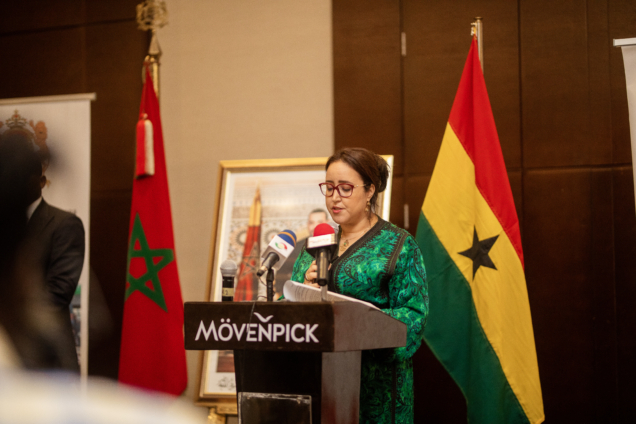Moroccan Ambassador to Ghana, Her Excellency Mrs. Imane Ouaadil has revealed that the Moroccan government’s automobile industry is set to witness a major boost that will see the country double its car production capacity to 1.5 million cars by 2026.
Her Excellency Ouaadil made this disclosure at the Movenpick Ambassador Hotel in Accra on Tuesday, July 30, at the Moroccan National Day event to celebrate the 25th anniversary of the King of Morocco, His Majesty King Mohammed VI since his ascension to the throne 25 years ago.
She used the occasion to highlight the great transformation of the North African nation under the reign of King Mohammed VI, saying over the past 25 years, Morocco, a thousand-year-old country, at the crossroads of cultures, “has experienced remarkable economic growth and structural reforms have been implemented to innovate, attract foreign investment, and modernize infrastructure.”
She noted that building on its location on the crossroads between Africa and Europe, Morocco under the King’s reign has attracted investments by automobile giants in Tangier, Casablanca and Kenitra.
She added that Morocco, which is currently Africa’s top car producer, will by 2026 double its current production capacity to 1.5 million cars.
She noted that the country’s automobile industry is also preparing for the shift to electric mobility.
In 2023, there were some 811,190 passenger cars produced on the African continent, an increase of around 13 per cent compared with the previous year. The two leading countries in passenger car production in 2023 were Morocco and South Africa.
But currently, Morocco has surpassed South Africa to claim the title of the continent’s largest car producer on the continent.
The North African nation’s automotive industry has surged in recent years, fueled by significant investments and strategic partnerships with global automakers. With factories operated by Renault-Dacia and Stellantis, Morocco has solidified its position as a major player in the global automotive industry.
Fitch Solutions forecasts that Morocco will produce just under 614,000 cars and light commercial vehicles in 2024. In contrast, South Africa’s production of passenger cars and commercial vehicles is projected to decrease to 591,000 units.
This trend is fueled by two factors, mainly poor logistical performance and an increase in vehicle imports in South Africa in 2024.
This is coupled with “continuous investments in the Moroccan automotive industry, which will support the growth of its local production, particularly regarding electric vehicle (EV) projects.”
Industry watchers believe Morocco is well-positioned to maintain its status as a top destination for automotive investments. This is due to several factors, which, in addition to the growth potential for electric vehicle production include the country’s proximity to the European Union, existing trade agreements, robust logistics infrastructure, and attractive market incentives.
Morocco produced over 582,000 cars in 2023, despite having a total production capacity of 1 million vehicles.
Infrastructure
On infrastructure development, Ambassador Imane Ouaadil said the Kingdom has also invested in world-class infrastructure such as the Tangier Med Port – the largest in the Mediterranean and Africa.
“The Dakhla Atlantic Port in the southern province of the Kingdom is Morocco’s largest infrastructure project, and once completed will become a regional and international logistic and trade hub” she added.
She also talked about Morocco’s progress in the aerospace industry as the country currently has 142 companies operating employing 20,000 people with a total output of 2 billion dollars.
She shed light on King Mohammed VI’s vision for African integration and its importance to the Kingdom.
“Under his reign, Morocco has strengthened its relations with many African countries, including Ghana, through his personal visits to these countries and signing cooperation agreements in various fields such as agriculture, health, education and infrastructure.”
She said the Atlantic Initiative launched by His Majesty in November last year to facilitate access for landlocked Sahel States to the Atlantic Ocean, stands as a distinctive framework aimed at fostering multidimensional African cooperation and promoting peace, stability and socio-economic stability on the continent.
She also mentioned that the development of the Nigeria-Morocco Atlantic African Gas Pipeline initiated by King Mohammed VI and former Nigerian President Muhammadu Buhari, has reached a critical juncture as high-level officials from twelve West African nations concluded a series of intensive meetings in Rabat last week.
“The entire West African coast to Morocco, is seen as a catalyst for economic growth, job creation, and improved energy access across the region” she noted.
Latest Stories
-
DAMC, Free Food Company, to distribute 10,000 packs of food to street kids
39 minutes -
Kwame Boafo Akuffo: Court ruling on re-collation flawed
58 minutes -
Samuel Yaw Adusei: The strategist behind NDC’s electoral security in Ashanti region
1 hour -
I’m confident posterity will judge my performance well – Akufo-Addo
1 hour -
Syria’s minorities seek security as country charts new future
2 hours -
Prof. Nana Aba Appiah Amfo re-appointed as Vice-Chancellor of the University of Ghana
2 hours -
German police probe market attack security and warnings
2 hours -
Grief and anger in Magdeburg after Christmas market attack
2 hours -
Baltasar Coin becomes first Ghanaian meme coin to hit DEX Screener at $100K market cap
3 hours -
EC blames re-collation of disputed results on widespread lawlessness by party supporters
3 hours -
Top 20 Ghanaian songs released in 2024
3 hours -
Beating Messi’s Inter Miami to MLS Cup feels amazing – Joseph Paintsil
4 hours -
NDC administration will reverse all ‘last-minute’ gov’t employee promotions – Asiedu Nketiah
4 hours -
Kudus sights ‘authority and kingship’ for elephant stool celebration
4 hours -
We’ll embrace cutting-edge technologies to address emerging healthcare needs – Prof. Antwi-Kusi
4 hours

